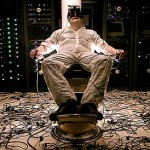Every few years a new phrase is pushed through marketing channels and trendsetters of all kinds, out into public consciousness. Recently, there has been one that particularly stands out as defining an emerging digital industry: The Metaverse.
Anybody who has read much science fiction, or played videogames, will know that this concept is hardly a new one even though packaged as such. Originating in 1992 with Neal Stephenson’s novel Snow Crash but perhaps more widely known through the recent cinematic adaptation of Ernest Cline’s Ready Player One, the concept has seen steady development and is an often-seen trope in science fiction across all mediums; even if not always under that specific name.
As our use of computers and smartphones becomes universal and the global economy more interconnected, there has been a resurgence in the idea of a more all-encompassing engagement with online worlds. The rise of social media, accessible VR and the interoperable persistence afforded by cryptocurrency and blockchain technology converge into what is being seen as the next evolution of our online lives. This begins with the recent emergence of so-called Web3 that combines everything into a cohesive whole, bringing together socialising, entertainment, learning and increasingly our work or business environment, but it will quickly become even more immersive and central to our lives.
Although it seems easy to criticise the concept of the Metaverse as a marketing phrase desperately in need of something tangible, it’s important not to dismiss the notion that our online lives will continue to evolve. Whether you are enthused, dismissive or even concerned by the idea, the internet is here to stay and will likely take up an increasing amount of our time both personally and professionally. Just a few years ago, most people scoffed at the idea that we would all be working remotely and regularly socialising with one another over international video calls – yet here we are and our lives continue to move ever-more online, for better and worse.
The Metaverse will be an extension of this and, given the sheer amount of resources both financial and creative being put toward the concept, it is one that will inevitably arrive in one way or another. Indeed, it is already here in its nascent form. TIME magazine is running a cover; Facebook has changed their name; and more and more resources flow into the space. A recent McKinsey report even estimated that up to $5 trillion of economic activity may be generated by 2030 alone.
Thirteen years ago (!!) I looked at the concept of augmented reality (AR) on this site and explored the pros, cons and dangers of such technology. The Metaverse is a similarly divisive topic and also worth exploring in this manner. Over a series of three posts, I will be looking at how this idea of the Metaverse might manifest as the Good, the Bad and the Ugly in a future where we delve headlong into its virtual arms.
Now, I know that many of you will want me to get straight to the critical parts. There’s an almost universal suspicion of the concept of the Metaverse in all but the most keen technological communities (and those funding them). Don’t worry, we’ll get to the Bad and the Ugly soon enough. Today, however, we are going to take a more positive look at the Metaverse and how it might be able to benefit our lives…
Online Connections
The central notion of Web3, and the idea of a Metaverse/s acting as a hub for anything created under its umbrella, is that we will be able to form deeper connections online then were previously available. This will come in large part due to the immersiveness of the experience, but it will also come from more tangible ways to interact with one another beyond text comments and livestream video calls.
When considering the best that a/the Metaverse might be able to offer, we can see how our online lives could be lived more experientially with improved social connectivity and expression of identity. These enhanced experiences in virtual spaces will also have fewer boundaries than our normal day-to-day lives. Individuals will be able to fully explore parts of themselves that they want to express, or things they want to create, in a way that not only provides the tools and environments to do so, but also new audiences ready to engage and uplift one another creatively, recreationally and emotionally.
Early examples of Metaverse-type environments have existed for many years, of course, particularly in the world of online gaming. Here, we can see that even though issues such as internet addiction or isolation are often the ones most highlighted, it is actually the stories of connectivity, accessibility and finding community that make up the majority of the experiences had by people engaging in these digital worlds. There is a reason why so many people enjoy playing online games and it’s not just because they are addictive, but because they are finding that they enhance and even in many regards improve upon aspects of their normal day-to-day lives.
It is easy for those of us living privileged lives (in different ways) to forget that others might be having a more difficult time. This can be because of mental health issues; various restrictions to one’s movement and senses; or it can come from socioeconomic circumstances often outside the control of those that feel the impact of them. Virtual worlds, particularly ones centered on social experiences, can be a huge release for many people from such pressures of life. They can provide new circumstances and events to explore, many of them otherwise outside of reach; or a sense of place and camaraderie they might be missing; even renewed inspiration that can take us into new areas of thought and expression.
We shouldn’t merely dismiss these experiences, already proven by millions of people online today, as merely fanciful or a ‘waste of time’. To many they are very real and, in some cases, even life-saving outlets that go beyond the sum of their digital parts and bring us into contact with the social core of what it means to be human. Humanity increasingly exists and interacts within the digital world and many people are figuring out what that means while also enjoying spending time there. There will be a real human experience that lies at the core of the Metaverse, one that can enhance our lives in new and inspiring ways.
Everyone is a Creator
The beginning years of the 21st century have witnessed an online revolution enabling millions of people to find new ways to earn a living and express themselves creatively. Most readily showcased by a new generation of YouTube stars, Twitch streamers and social media influencers, the way in which our consumerism and media use moved online created entirely new professions that would have seemed ridiculous (and indeed, were criticised as such) even just a decade ago.
The same will be the case with the Metaverse. To begin with, the platforms and avenues we see now will evolve into more connected and immersive environments. There will be podcasters and commentators; spiritual teachers and fashion models; e-sports competitions; artists; coders; musicians; storytellers; sex workers and more. All those who found a platform in Web 2.0 will be able to convert that over to the Metaverse and Web3, with even more loyal audiences and communities engaged on a level that swiping a browser or looking into a webcam can’t muster. They will not only be engaged, but collaborative and keen for as much tangible interaction as possible.
The toolsets available to new creators are also becoming easier to use and more widespread. This is a major component of the Metaverse concept, that it will allow us to all express ourselves in new and imaginative ways. Not just by paying others for the privilege, although that will certainly be a major component (for better and worse), but by having tools that are accessible and intuitive that enable us to have agency over our own virtual creations. Web2 brought everyone together into an online environment where creativity and sharing were central, with traditional avenues given new democratic platforms and audiences in the tens of millions. Web3 takes this into new mediums such as environment creation; game design; community storytelling and immersive experiences that will increasingly bring on board more of our senses and identity.
In the Metaverse (or more likely, metaverses plural) you can stretch out your wings and fly into whatever creative outlet you might wish to explore, in a way that will be more accessible than ever and with all the tools you need right at your virtual fingertips. With each passing month, these tools become more intuitive to use as they evolve beyond the professional world and into mainstream use. The future of our online selves will not only be one where we share photos and video links, or even stream ourselves to a live audience, but it will also be one where we are actively creating the spaces we want to see and experiences we want to share with our friends and wider audiences of like-minded people.
Virtual Business & Entrepreneurs
With new spaces and creative tools come new opportunities to earn a living online. We’ve already seen examples of this in virtual environments such as Roblox, Minecraft and Second Life and many more – where creators, designers and coders are able to generate new content and experiences for users and charge micro-fees for access (and advertising) that add up to significant income for those able to generate an audience or find the right niche.
Essentially what this means is that new categories of professional activity become available and for larger numbers of people. There is, of course, a point of saturation that occurs and one of the drawbacks of the accessibility of virtual environments is that it can be hard to stand out among so many people. However, this is where the nature of different subcultures, groups and special interests comes into play and the Metaverse will enhance our ability to both create and find these different groups of people, no matter how niche.
Although it might be difficult to compete against so many people in popular categories, within certain niche interests, that already require a degree of personal commitment and/or knowledge, the barrier for success with new economic activity becomes lower as there is already a filter in place for the subgroup itself. All kinds of different opportunities will present themselves for individuals to follow their passions and hobbies into a sustainable, enjoyable and socially-focused lifestyle. Just as video sharing platforms allowed hobbyists all over the world to make a living off their passions, so the coming era of the Metaverse will provide ample means to do so.
This not only presents commercial opportunities, but as the landscape of virtual worlds evolve so will the need for new services, efficiencies and solutions to problems or wants faced by users. Entrepreneurship works best in spaces that are fresh from the influence of large multinational corporations, impossible to compete with as they are, and so the nimble, intuitive users of these new virtual worlds will be able to both spot the gaps and fill them with useful solutions. This will promote grassroots innovation that can be both deeply creative and fulfilling, while also being financially successful and (in some cases) extremely lucrative for those who find themselves best situated to take advantage of the opportunities that present themselves.
Learning & Personal Development
The educational opportunities that emerged from the internet have been immeasurable in their social impact. What would have previously been situated on dusty library shelves, expensive sets of out-dated encyclopaedias, or the limited spaces of university courses is now available to nearly everybody and in a manner that is both readily accessible (in many instances free of charge) and optimised for effective learning.
The internet has worked fantastically well for knowledge conveyed by the written word, or tasks that can be taught through video tutorials, but it can be difficult to cross into other areas that require a greater degree of physical and spatial awareness or even emotional engagement. The collaborative, immersive environments of the Metaverse, that place a greater emphasis on space and identity, will be able to build upon the educational successes of the internet and allow new areas of online learning and development to flourish. Not only from a personal perspective exploring at one’s leisure, but in more structured experiences; including those that will be produced from educational organisations well-tuned to convey information and achieve specific end results.
Outside of purely educational opportunities, there will be new avenues for personal development in other areas in ways that are more engaging (and therapeutic) than the online environments we are currently used to. The immersive nature of the Metaverse will enable people to have much deeper experiences than are otherwise currently available. The possibilities here are endless: from overcoming phobias and trauma; working through grief; finding new ways to work through learning difficulties; to developing deeper levels of empathy for the experiences of others. Even just the ability to overcome the crippling loneliness that so many people are experiencing today is reason enough to celebrate this forthcoming outlet for human connection.
For some this might sound trite or perhaps even worrisome, as they prefer to focus on real-world activities rather than virtual ones. But for those who don’t have access to these kinds of activities (due to various restrictions whether physical, emotional or financial) the online realms of the Metaverse can provide a new outlet for social engagement, recreational and learning activities and adventure of all kinds.
It’s important not to hand-wave away the benefits that such accessibility can provide for those otherwise unable to experience what it is like to socialise in a nightclub; travel the world; or visit important sites of learning, faith and culture. As much as we might want to immediately criticise the concept of the Metaverse as something that will take us away from the authenticity of experiences in the real world, doing so comes from a position of privilege and we should know that, for many unable to do such things, virtual worlds provide an important outlet to explore and share with one another in actively engaged ways.
Conclusion
These are just four of the main categories in which we can see some Good that can come out of the growing infrastructure and experiences known collectively as the Metaverse. There is a lot of excitement around the concept, particularly now that our technology is able to deliver experiences that are truly immersive and hands-on. The key threads that run throughout the benefits discussed above are community, creativity and tangible outcomes to our time spent in these persistent virtual worlds.
The Metaverse is not just a gaming environment, but one in which we will socialise and learn; work and play; meet new friends and romantic interests; teach our children new things and impart wisdom to one another. It is an extension of our normal lives in every way; set free from the limitations of the material world, where our imaginations can rule and create new boundaries of experience.
Even so, whenever the concept of the Metaverse is discussed, there are a large number of people who are quick to criticise it as a time-wasting distraction; or worse, one filled with scams and hollow promises that never eventuate. These criticisms are often focused on to the detriment of constructive discourse on what such technology can provide, but we can’t ignore the downsides that we can already see emerging.
Although a great deal of Good can come from any revolutionary technology, we know all-too-well how hard we must work to counteract the more divisive and destructive sides of humanity. In the next two parts of this series we will look at how the Metaverse might have a negative impact on us and, even worse, how it can (and probably will) be used by unethical actors to cause a great deal of harm.
By exploring these areas, we can hopefully be better equipped to discuss how we can avoid, or at least mitigate, their influence to the best of our ability and allow the benefits made available by the coming Metaverse/s to shine through.







